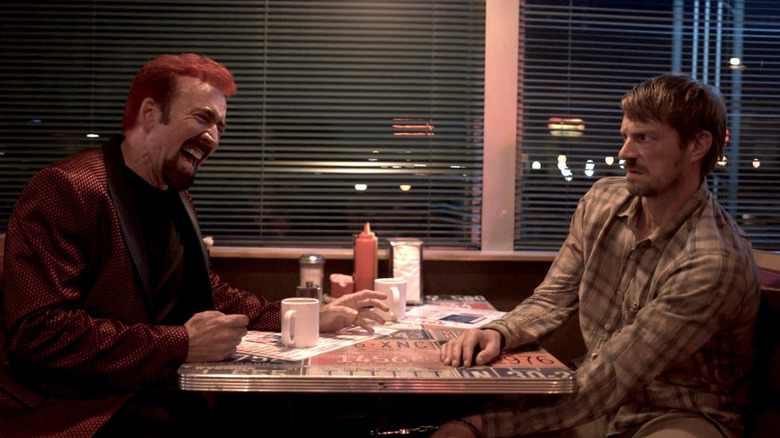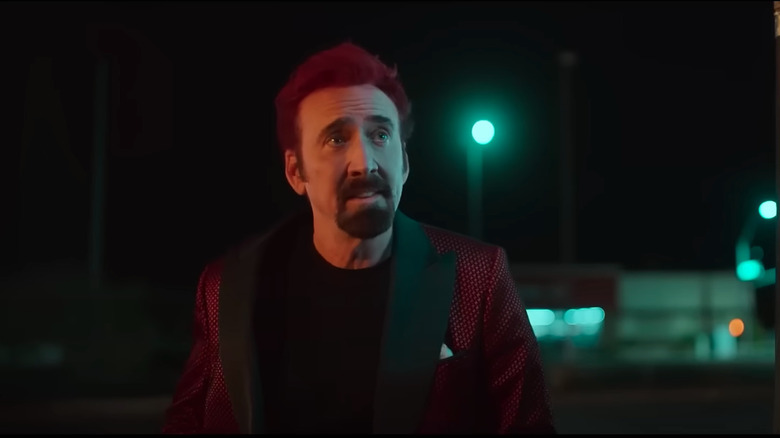Sympathy For The Devil Review: Sympathy For The Audience Is More Deserved
- The two leads have charisma to spare, albeit in very different ways
- Confusing tone
- Story poses many questions that are never answered
Before it was the title of a movie, "Sympathy for the Devil" was a song by the Rolling Stones. The song recites a long list of incidents the Devil had a hand in, making it easy to guess his name, as the song instructs. The movie "Sympathy for the Devil," which does not feature the song, isn't nearly as clear. It features two men — one a passive family man (Joel Kinnaman), the other a man who gets into his car with a gun (Nicolas Cage) — who clash over the course of the 90-minute film. It seems obvious who the Devil is in this situation, but until we hear his story, we can't be sure.
The movie starts simply enough. The man who drives the car, who's called David, drives to his wife's bedside in a hospital in Las Vegas. She's in labor with their third child. Although the first one died soon after being born, their second one has grown into an adorable little boy and they're hoping the third will have similar luck. But before David can even exit the car, a man gets in, brandishing a gun — we'll call him the Passenger — and tells David to drive away.
Seeing no other choice, David does as he's told, driving away from the hospital, his wife, and their new baby. At first, David seems compliant and the Passenger seems deranged. Not only does the Passenger threaten David with the gun, but he uses that gun on people. First, he shoots and kills a cop (Cameron Lee Price) who pulls them over, and then he uses it to maim and kill people in a diner. Over the course of "Sympathy for the Devil," though, which takes place nearly in real-time, there are revelations about both the Passenger and David that complicate the situation, making it harder to say the Passenger was wrong to abduct and threaten to kill David after all.
Tone problems
The main problem I have with the film is that it has a confusing tone that makes it hard to get a grip on how seriously you should take this situation. The two men in the car have tons of charisma but for very different reasons. Cage can have an unhinged quality that lends itself to making this kind of role ... well, kind of funny. While other people might deliver lines like "I'm your family emergency now" and "sit the f*** back down" with no irony, Cage delivers them with a hint of glee. There's menace to his delivery, too, but it's the glee that makes his character's mental state seemingly all the more precarious, while also bringing a zhuzh of life and verve to the proceedings.
Kinnaman, who's starred in shows like "Hanna" and "For All Mankind" and movies like "RoboCop" and "Suicide Squad," on the other hand, is all business. There isn't a hint of amusement or fun in his line readings, and that's further reinforced by his sober body language. Kinnaman knows how to do things efficiently and effectively, but he doesn't really know how to match Cage's joie de vivre. This makes their match-up a bit strange.
While Cage's Passenger may be a cold-blooded cop killer, he's also fun to watch. He might even make you laugh if you let him — he's that amusing in the role. Kinnaman's David, however, doesn't have even a little of what makes Cage watchable. While it's understandable as the one under duress that he would have the less flashy role, Kinnaman's so serious that this creates a clash of tones. Are we supposed to laugh at this situation, as Cage's performance suggests, or are we supposed to take it deadly seriously, as Kinnaman's performance would indicate? The movie doesn't pick a side, and so the confrontation between David and the Passenger goes from being amusing to being startlingly serious with not much in between.
This tonal indecisiveness is wearying. While without Cage the movie would likely be boring, with Cage it's amusing in a way no one may have intended. The director Yuval Adler may have been so taken with Cage's performance that he decided to go with it, but for the average viewer, throwing in a wildcard like Cage into the mix makes the story more difficult to get on top of.
Story problems
Then there's the story itself. It should come as no surprise that there's more to the story than the Passenger just targeting a random guy at a hospital. There's much more to both of their tales. Was the Passenger always unhinged? Did David always want a family? Who lived in a trailer the Passenger blew up? These and more questions come to mind as the movie unspools, but we never get answers.
Instead, the movie hinges on the details of the situation that brought the pair together, but no other specifics are given. It's a quirk of the real-time rules that we can't see anything outside of the current scenario, but the questions left dangling are worth asking, and in another director's hands some of them might even be answered. Adler, however, sticks to the bare bones of the script, written by Luke Paradise, and therefore we only get a hint of the story beyond the situation we see onscreen.
The final product is disappointing. Both men are good in their roles, but they each need different co-stars — or a director to tell them to play things differently — to make the movie work. The story would also benefit from more time to fill in the blanks. As it stands, the movie is really only interesting because Cage makes it so — and even then, only sporadically. Otherwise, the story is boring, and even the hint that there's more going on can only sustain the average audience member so much. It's a shame that with two great actors, "Sympathy for the Devil" isn't better.
"Sympathy for the Devil" will be released in theaters on July 28.
This piece was written during the 2023 WGA and SAG-AFTRA strikes. Without the labor of the writers and actors currently on strike, the movie being covered here wouldn't exist.


